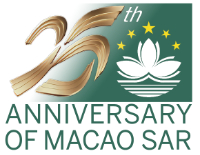As Macao celebrates its 25th anniversary of the handover to China, it is an appropriate opportunity to reflect on its uniqueness and enormous potential. It might surprise some, but Macao is the most densely populated region in the world, with 23,152 inhabitants per square kilometer, compared with Hong Kong’s 6,753 per sq km. However, it is also relatively small, measuring only 33 sq km, or less than half the size of Hong Kong Island.
 Yet appearances can be misleading. Macao can punch far above its weight, notwithstanding its diminutive size. Because of its history as a Portuguese colony, it is naturally connected to the Portuguese language, which is still one of Macao’s official languages. The combined global population of Portuguese-speaking countries, also known as the Lusophone world, is approximately 270 million people, according to Wikipedia. This includes native speakers and those who speak Portuguese as a second language.
Yet appearances can be misleading. Macao can punch far above its weight, notwithstanding its diminutive size. Because of its history as a Portuguese colony, it is naturally connected to the Portuguese language, which is still one of Macao’s official languages. The combined global population of Portuguese-speaking countries, also known as the Lusophone world, is approximately 270 million people, according to Wikipedia. This includes native speakers and those who speak Portuguese as a second language.
Brazil has the largest Portuguese-speaking population, with about 203 million native speakers. Other significant Portuguese-speaking countries include Portugal, Angola, Mozambique, and Cape Verde. As Brazil is also a founding member of BRICS, there is already a positive and close relationship with China. Macao can benefit by attracting Brazilian tourists and traders. Do remember what a powerhouse Brazil actually is: 8.5 million sq km (roughly the size of the United States), and a GDP of over $4 trillion. Macao should be the business linchpin between China, Brazil, and the other Lusophone countries. This fits in perfectly with the Belt and Road Initiative and the Guangdong-Hong Kong-Macao Greater Bay Area development.
 Macao has the international reputation of being the Las Vegas of the Far East, which, while being true, does not reflect the complete story. Casinos are a great training ground for hospitality and services professionals. Working effectively in a fast-paced, high-pressure environment where large sums of money are won or lost and emotions run high is a very good testimonial for anyone seeking work in the hospitality, recreation or travel sectors. The fact that the casino owners have built and successfully run large luxury hotels around the casinos is a testament to this. Macao, therefore, has the tools to become the national leader in training for work in hospitality, leisure, entertainment, conference and other service sectors. As China again receives more international visitors, benefiting from its ever-expanding visa-free travel program, service professionals trained at the highest levels and being proficient in foreign languages will be needed nationwide. Also, Hong Kong can benefit from highly trained staff in the hotel and the food-and-beverage sectors.
Macao has the international reputation of being the Las Vegas of the Far East, which, while being true, does not reflect the complete story. Casinos are a great training ground for hospitality and services professionals. Working effectively in a fast-paced, high-pressure environment where large sums of money are won or lost and emotions run high is a very good testimonial for anyone seeking work in the hospitality, recreation or travel sectors. The fact that the casino owners have built and successfully run large luxury hotels around the casinos is a testament to this. Macao, therefore, has the tools to become the national leader in training for work in hospitality, leisure, entertainment, conference and other service sectors. As China again receives more international visitors, benefiting from its ever-expanding visa-free travel program, service professionals trained at the highest levels and being proficient in foreign languages will be needed nationwide. Also, Hong Kong can benefit from highly trained staff in the hotel and the food-and-beverage sectors.
The economic success and growth of Macao — Hong Kong’s close neighbor and fellow SAR — naturally also benefits Hong Kong, and vice versa. Tourists from one SAR will continue to visit the other, and businesses entering the region can benefit from the strengths of both SARs
This is one reason Macao can host large-scale international events like the Macao International Fireworks Display Contest and the Grand Prix. These events attract millions of tourists every year and position Macao well for future global sporting events.
However, it is also outdated to think of Macao as only being about gambling, tourism, recreation and sporting events. Technology and innovation are also key drivers of the city’s ambitions going forward. In this regard, Macao has benefited greatly from its physical location: The Guangdong-Macao In-depth Cooperation Zone in Hengqin was officially established in September 2021 to foster closer integration between the two regions. The zone has become a hub for innovation and entrepreneurship, hosting nearly 6,500 Macao-invested enterprises and providing a platform for new industries. Our sister special administrative region is also becoming more active in aligning with the Chinese mainland’s broader space exploration ambitions, having launched its first space science satellite at the Jiuquan Satellite Launch Center in May 2023.
This small place is becoming so successful because of the recent major and impressive infrastructure projects in and around Macao: the Hong Kong-Zhuhai-Macao Bridge, the Guangzhou-Zhuhai Intercity Railway, and Hengqin Port. Because of these projects, Macao has become well-connected and more integrated with Hong Kong and the mainland, facilitating cross-border transport of people, services, and goods.
The economic success and growth of Macao — Hong Kong’s close neighbor and fellow SAR — naturally also benefits Hong Kong, and vice versa. Tourists from one SAR will continue to visit the other, and businesses entering the region can benefit from the strengths of both SARs.
We in Hong Kong toast the continued success and well-being of the Macao Special Administrative Region! Long may she prosper!
The author is an adviser on China-related matters to both the private and public sectors, and was the first non-Chinese CEO of a Chinese State-owned finance company.
The views do not necessarily reflect those of China Daily.


